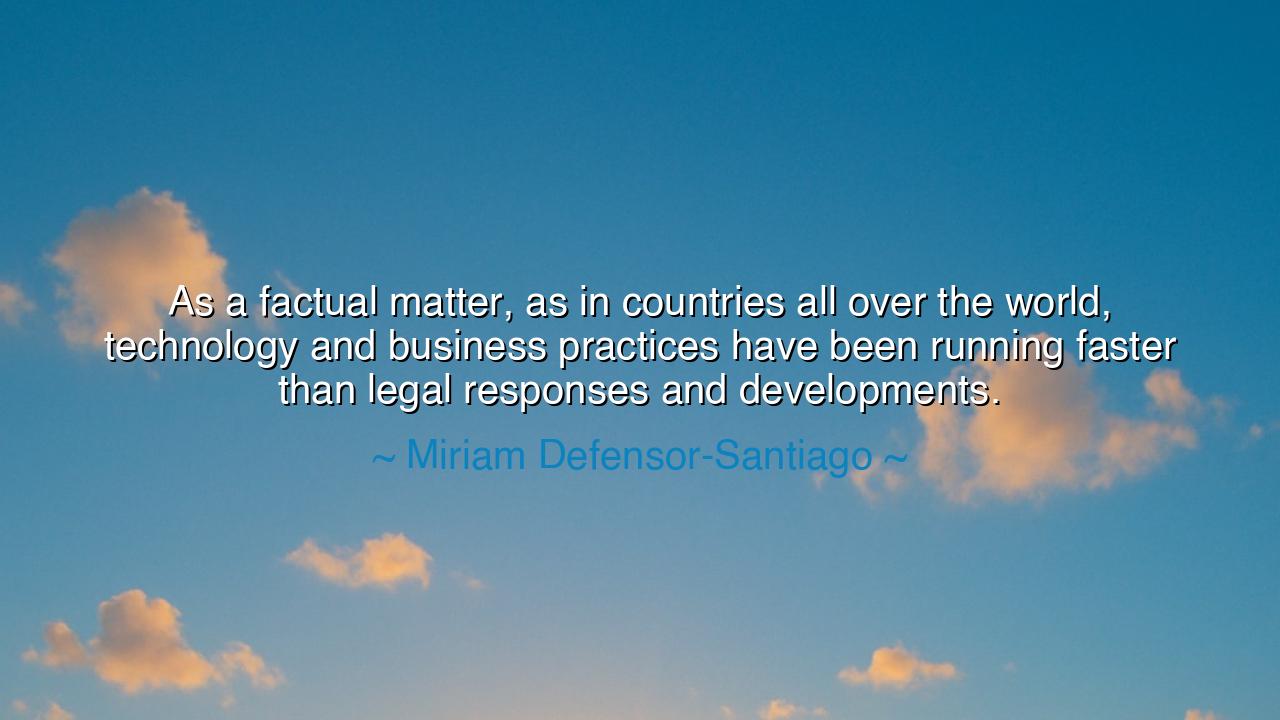
As a factual matter, as in countries all over the world
As a factual matter, as in countries all over the world, technology and business practices have been running faster than legal responses and developments.






In the vast chronicles of human civilization, there exists a recurrent truth: innovation often outpaces the guardians of law. Miriam Defensor-Santiago’s words, “As a factual matter, as in countries all over the world, technology and business practices have been running faster than legal responses and developments,” speak to this enduring tension between human ingenuity and societal regulation. From the invention of the printing press to the rise of the internet, each leap in human capability has challenged the frameworks of justice, demanding that the law stretch, adapt, and catch up. Here lies a meditation on balance: progress is relentless, yet society’s protections must not be left behind.
Consider the example of ancient Rome, where the rapid expansion of commerce across the Mediterranean created a web of contracts, debts, and trade practices that the existing legal codes struggled to govern. Merchants innovated faster than magistrates could legislate, and disputes multiplied in courts unprepared for the novel circumstances. Defensor-Santiago’s observation mirrors this ancient phenomenon: when human enterprise moves faster than the structures designed to oversee it, uncertainty and imbalance inevitably arise.
History provides further illustration. In the Industrial Revolution, factories, railroads, and new financial instruments emerged at breakneck speed. Laws protecting workers, consumers, and the environment were decades behind the technological and business realities. Only after public outcry, political advocacy, and reform did regulations such as labor laws, safety codes, and banking standards begin to catch up. Defensor-Santiago’s reflection reminds us that progress carries both promise and peril, and that the guardians of society must remain vigilant.
In contemporary times, the acceleration of technology is even more pronounced. Digital platforms, artificial intelligence, and blockchain have introduced methods of commerce, communication, and influence that legal frameworks scarcely anticipated. Across the globe, regulators struggle to draft rules that both encourage innovation and protect citizens. The gap between action and oversight is not a failure, but a natural consequence of human creativity racing ahead of institutional adaptation. Santiago’s wisdom is timeless: we must acknowledge the speed of change while striving to create responsive and resilient systems.
A real-world illustration lies in data privacy and social media. Platforms grew rapidly, collecting, analyzing, and monetizing personal information long before laws like the European GDPR were conceived. Millions of users’ rights and protections were at risk until legislation caught up. Similarly, financial technologies such as cryptocurrency often operate in regulatory grey zones, leaving participants exposed. Here, Santiago’s words resonate: human enterprise evolves swiftly, and legal structures must strive to meet it without impeding the creative impulse.
The lesson is profound: society must cultivate foresight, adaptability, and proactive engagement. Citizens, leaders, and regulators cannot passively react to innovation; they must anticipate its trajectory, identify potential risks, and craft rules that balance freedom with protection. Defensor-Santiago teaches that understanding the natural lag between invention and regulation is essential for maintaining justice, equity, and societal stability amidst rapid progress.
Practically, this wisdom calls for vigilance in both personal and professional life. Stay informed of emerging technologies, understand the ethical and legal implications of new business practices, and advocate for responsible frameworks. Support efforts that bridge the gap between innovation and regulation, ensuring that human creativity does not outpace the protections necessary to safeguard communities. By doing so, we honor both progress and prudence, cultivating a society that thrives safely amidst change.
Thus, Miriam Defensor-Santiago’s words echo as a timeless admonition: innovation is unstoppable, but law and ethics must strive to keep pace. Let all who hear this teaching remember that the power of human ingenuity carries responsibility; without thoughtful oversight, the blessings of progress may become the seeds of disorder. Wisdom lies in acknowledging the gap, preparing to act, and ensuring that humanity’s creations serve not just speed, but justice, equity, and the common good.






AAdministratorAdministrator
Welcome, honored guests. Please leave a comment, we will respond soon